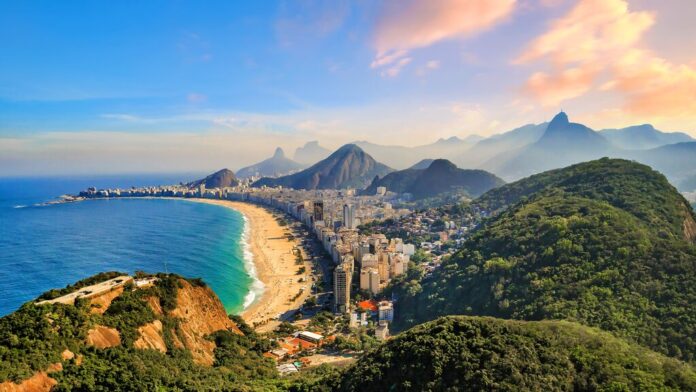Rio de Janeiro, commonly known as Rio, is a bustling seaside city located in Brazil, a South American country situated in the southeastern region of the continent and very close to the Tropic of Capricorn. As the second most populous city in Brazil and the sixth most populous in the Americas, Rio serves as the capital of the state of Rio de Janeiro, which ranks as the third most populous state in Brazil after Sao Paulo and Minas Gerais.
UNESCO designated a part of Rio de Janeiro as a World Heritage Site on July 1st, 2012. Founded by the Portuguese on March 1st, 1565, Rio is renowned for its rich cultural heritage, sprawling favelas (shanty towns), and vibrant Carnival festivals, featuring parade floats, flamboyant costumes, and samba dancers.
The city is celebrated for its natural beauty, highlighted by landmarks such as the Giant Statue of Christ the Redeemer atop Corcovado Mountain, which is one of the New Seven Wonders of the World, Sugarloaf Mountain with its iconic cable car, the Sambadrome, and the Maracana Stadium. Rio de Janeiro has hosted several prestigious international sports events, including the Summer Olympics and Paralympics in 2016, the FIFA World Cup finals in 1950 and 2014, the FIFA Confederations Cup in 2013, and the XV Pan American Games.
Rio’s harbor, Guanabara Bay, is recognized as one of the seven natural wonders of the world, surrounded by tall mountains yet easily accessible to ships. Portuguese is the official language spoken in Rio de Janeiro, and the currency used is the Brazilian real, although American dollars are also accepted.
However, Rio de Janeiro faces significant safety challenges, with a high crime rate, including frequent occurrences of violent crime, bag snatching, and pickpocketing. Visitors are advised to exercise caution, particularly when visiting churches and government buildings, where a strict dress code applies. Additionally, certain hand gestures, such as the OK sign, may be considered rude or vulgar in Rio’s cultural context.
Despite its safety concerns, Rio de Janeiro remains a vibrant city known for its love of football and its rich history of hosting international sports events.
Rio De Janeiro Weather
According to the Köppen climate classification, Rio de Janeiro features a tropical savanna climate. Throughout the year, temperatures typically range from 65°F to 88°F, with occasional lows of 61°F and highs rarely exceeding 95°F. Summers in Rio are characterized by short, hot, oppressive conditions, with frequent rainfall and mostly cloudy skies, while winters are long, comfortable, humid, and mostly clear.
The hottest month in Rio de Janeiro is January, coinciding with the wettest period of the year, with an average rainfall of 170mm. Conversely, June marks the coldest month, with a more comfortable average temperature of 19°F.
Rio experiences a distinct rainy season from December to March and a dry season from May to October. Therefore, the optimal time to visit Rio de Janeiro is typically between December and March, allowing visitors to enjoy warm and sunny weather, even on the city’s beautiful beaches.


